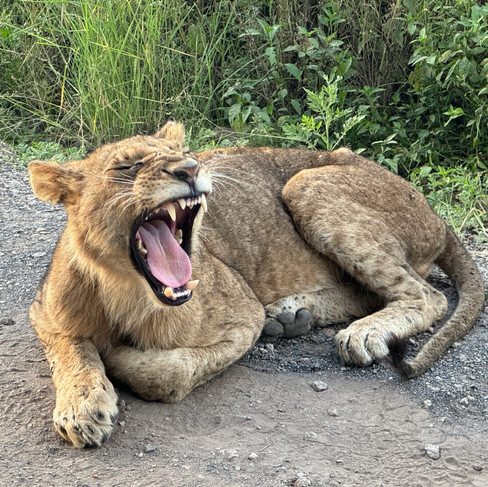Highlighting Our 2024 Impact.
- Wild Heart Kenya
- Dec 26, 2024
- 4 min read
Updated: Jan 3, 2025

Thank you!
At Wild Heart Kenya, our mission is rooted in climate justice through gender equality and this year has been no exception. We pursue our objectives using nature regeneration with communities as a means of climate mitigation and empowering women affected by climate change, alongside climate education initiatives.
In 2024, our focus extended to supporting children and women adversely affected by climate change. We have actively engaged in policy formulation for climate justice in collaboration with UN Women, contributing to broader efforts to address the challenges posed by climate change. Be sure to scroll down to see what a busy year we have had!
Here is our impact in numbers:
4,000 mangrove trees restored
150 fruit trees planted
Over 300 community members benefitted
2 lion lights installations
6 climate education workshops
2 art with climate education school workshops
Over 150 girls benefitted from our end period poverty campaign
Attended 3 Conference of Parties concerning Biodiversity, Climate Change and desertification
Mangrove restoration is at the heart of our nature restoration efforts, and regeneration of these vital forests as a means of climate mitigation and empowering women affected by climate change is core to our work. Working alongside women, we are revitalizing these critical ecosystems, which serve as carbon sinks and protect against coastal erosion. Mangroves provide habitat for marine life, support biodiversity by acting as homes for endangered species, enhance water quality, and stabilize shorelines.
We are thrilled to have supported the reforestation of over 4,000 mangroves in Kenya’s Funzi coastal area. All our seedlings are sourced from the indigenous fishing community, fostering a green economy and providing income to support school fees and healthier living spaces. By restoring mangroves, we aim to combat these challenges, empower local communities, and make meaningful strides toward climate change mitigation.
Our climate education initiatives focus on empowering children living near the borders of Tsavo National Park, an area deeply affected by droughts and climate change. This year, we organized two art workshops that used creativity as a tool for education and empowerment. Through art, children expressed their experiences, concerns, and hopes for addressing climate challenges. The workshops fostered awareness and inspired actionable solutions, demonstrating that even young voices can play a critical role in shaping a more sustainable future.
As part of our greening and climate mitigation efforts, we have focused on planting fruit trees near Tsavo National Park. This initiative aims to improve food security, enhance environmental sustainability, and educate children about the importance of nature stewardship. In 2024, just in time for the perfect rains, we planted 150 fruit trees, creating a lasting impact on both the environment and the communities we work with. By nurturing these trees, we are fostering a connection between children and the land, inspiring them to take active roles in environmental conservation.
Climate change has intensified human-wildlife conflicts, threatening both communities and wildlife. In areas surrounding Nairobi National Park, predators like lions follow migrating prey animals onto community lands during the rainy season. This proximity to livestock leads to devastating consequences, including livestock losses, human injuries, and retaliatory killings of predators.
To address this, we have proudly supported several installations of David Mascall's "Light for Life" system. These solar-powered flashing lights, placed around livestock enclosures, create the illusion of human presence, effectively deterring predators. This innovative solution not only safeguards livestock and human lives but also protects the vulnerable predator populations, fostering a more harmonious coexistence between people and wildlife.
This year, we conducted six climate education workshops aimed at raising climate change awareness and building the capacity of communities affected by its impacts. These workshops focused on fostering a deeper understanding of the role fossil fuels play in driving climate change and explored the importance of nature restoration as a key strategy for mitigation. By engaging participants in discussions and interactive sessions, we provided them with actionable knowledge and tools to address climate challenges in their local contexts. These workshops not only empowered communities to take informed steps toward sustainability but also strengthened their resilience in the face of a changing climate.
We supported 150 girls affected by period poverty by providing them with sanitary kits and offering mentorship. Many of these girls come from families heavily impacted by climate change, which has strained household incomes and made basic necessities, such as menstrual products, unaffordable. This lack of access often leads to girls missing school during their periods, further widening the gender equality gap by limiting their educational opportunities. Through this initiative, we aimed to address these challenges, ensuring that these young women can attend school consistently and empowering them to pursue their goals without being hindered by the dual burdens of poverty and climate change.
This year, we actively participated in three key global events: the UN Conference on Biodiversity, the UN Conference on Desertification, and the UNFCCC COP, where we chaired the Rio Conventions Committee as leaders under the Feminist Action for Climate Justice, convened through the Gender Equality Forum under UN Women. Our engagement stemmed from recognizing the critical gap between grassroots realities and the implementation of global policies.
We followed negotiations on gender equality, loss and damage finance, and shared our grassroots insights through side events, highlighting challenges like period poverty, human-wildlife conflicts, and women's unique experiences in climate-affected regions. At Wild Heart Kenya this is crucial, as we focus on addressing human-wildlife conflicts and promoting land restoration. Through sustainable land management, we aim to ensure that both communities and ecosystems thrive, aligning our grassroots initiatives with global commitments for a resilient future.
We thank you for your unwavering support! Be sure to follow us on our socials - Instagram, Facebook & Twitter to keep up to date with our latest news.
Together we have made such a positive impact in 2024 and we will continue to do work toward transformational positive change in 2025 and beyond. Wishing you all a very happy wild year!
Gratefully,
Wild Heart Kenya Team.

















































Comments